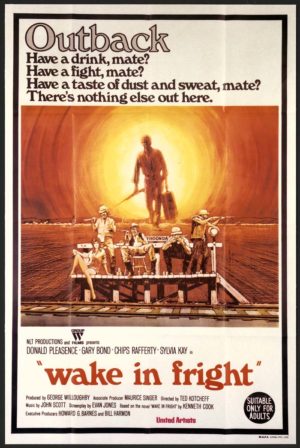 This Australian film, also known as OUTBACK, is at once a uniquely insightful, intelligent character study and probably the darkest, grittiest—and, I’m told, most realistic—depiction of rural Australia ever committed to celluloid.
This Australian film, also known as OUTBACK, is at once a uniquely insightful, intelligent character study and probably the darkest, grittiest—and, I’m told, most realistic—depiction of rural Australia ever committed to celluloid.
Quite a few Aussie critics have dubbed WAKE IN FRIGHT (1971) the greatest Australian movie ever. An intriguing verdict, as it was made by Canadian filmmaker Ted Kotcheff (whose other features include THE APPRENTICESHIP OF DUDDY KRAVITZ, FIRST BLOOD and WEEKEND AT BERNIE’S) with British financing, and because its portrayal of the Australian populace is anything but flattering.
Much of WAKE IN FRIGHT’S considerable power was gleaned from Kenneth Cook’s stunning 1961 source novel (which is, sadly, little known outside its native Australia). Also deserving of credit is lead actor Gary Bond, who’s in every scene and remains sympathetic throughout, despite the fact that his character is a whiny, conceited jerk whose problems are in large part his own doing.
John Grant, a sensitive Australian schoolteacher, finds himself stuck teaching in Tiboonda, a desolate outback town, in order to obtain his credential. Halfway into his two-year tenure in Tiboonda he leaves for a summer vacation in Sydney. This entails an overnight stay in Bundanyabba, a more populous though just as primitive region (from the book: “it was just a larger variation of Tiboonda, and Tiboonda was a variation of Hell”). Life in “the Yabba” is harsh to say the least: its Cro-Magnon inhabitants are never far from a brawl at any given time, and their hospitality is forever tinged with none-too-disguised hostility.
John finds his own darker instincts boiling over when he visits a raucous gambling den and, inexorably caught up in the madness, gambles away all his money. Finding himself trapped in the Yabba, and increasingly disturbed by his all-too-ready acceptance of the town’s rough-and-tumble existence, John shacks up with Doc (horror movie mainstay Donald Pleasance), a ruffian whose life consists of endless bouts of boozing, fighting and hunting. In the film’s most disturbing—and controversial—sequence, Doc and his buddies take their guest on a nighttime kangaroo hunt where John enthusiastically joins in the drunken bloodlust of his companions.
The next day, horrified by the past night’s revelation of his “dark side,” John tries desperately to escape the Yabba, but winds up a babbling recluse wandering the outback wilderness. It all culminates in a failed suicide attempt, followed by a happy ending of sorts: John’s hospital recuperation is paid for by Doc, who also lends him the funds to travel back to Tiboonda…the original “variation of Hell.”
To be sure, there are more than enough descent-into-savagery movies to go around, but this one is unique on many levels. Ted Kotcheff’s refusal to mold the proceedings into a thriller in the manner of STRAW DOGS (which WAKE IN FRIGHT resembles in many aspects) or a hallucinatory drama a la WALKABOUT render the psychological horror story at this film’s center all the more unsettling. The film is shot in a straightforward, ultra-naturalistic style that fits the material perfectly.
Kotcheff also doesn’t shy away from the story’s nastier, more upsetting elements. The graphically depicted marsupial slaughters are all entirely REAL, lending the film a frankly repugnant aspect unrelated to the content (tempered somewhat by the fact that the shootings were, as an elaborately worded end credits statement informs us, documentary footage shot during a licensed kangaroo hunt…and the fact that in the book the slaughter was MUCH nastier). The end result, kangaroo killings and all, is an unforgettably vivid look into a region few of us, Australian or otherwise, will ever see up close.
Vital Statistics
WAKE IN FRIGHT (a.k.a. OUTBACK)
NLT Productions; United Artists
Director: Ted Kotcheff
Producer: George Willoughby
Screenplay: Evan Jones
(Based on a novel by Kenneth Cook)
Cinematography: Brian West
Editor: Anthony Buckley
Cast: Gary Bond, Donald Pleasance, Chips Rafferty, Sylvia Kay, Jack Thompson, Peter Whittle, Al Thomas, John Meillon, John Armstrong, Slim DeGrey, Maggie Dence, Norm Erskine, Owen Moase
